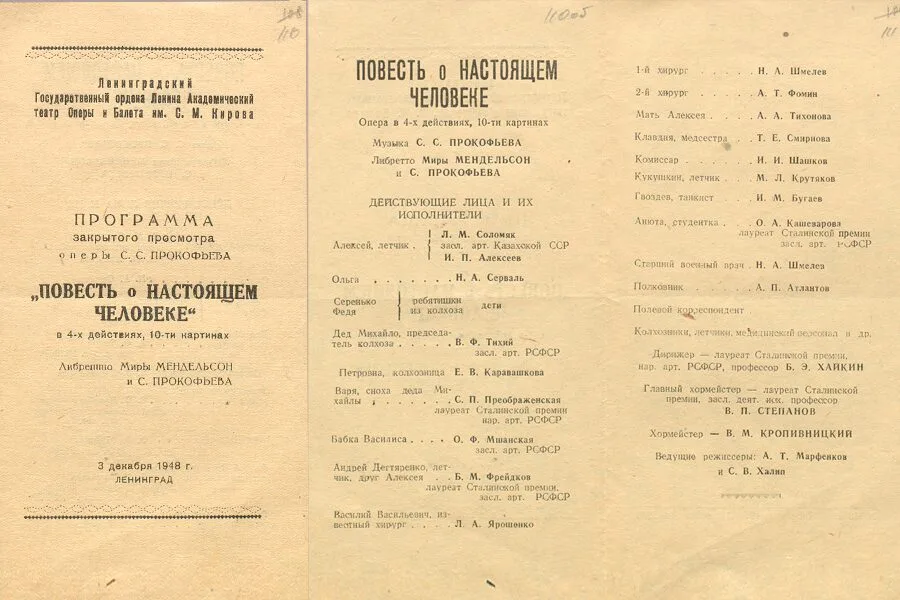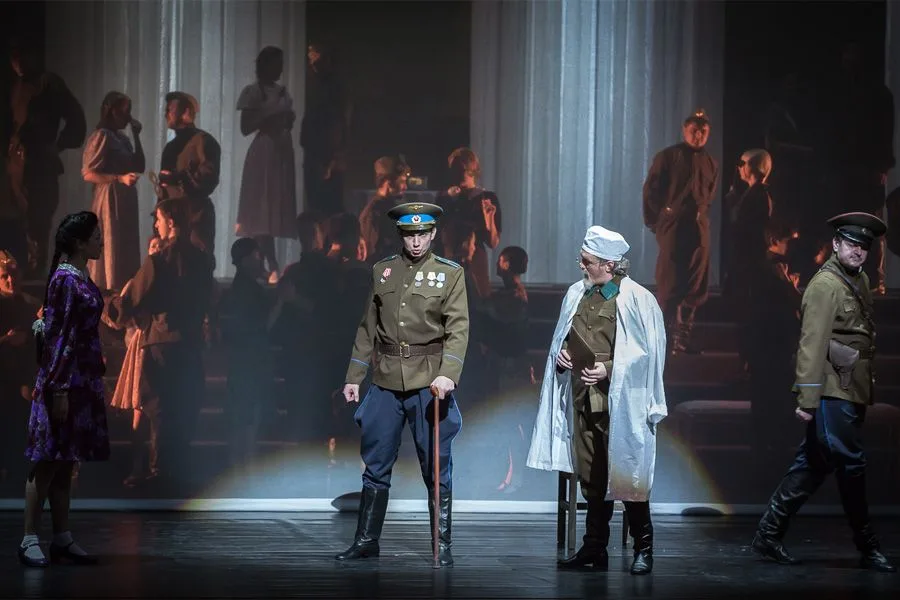Many myths have developed around the content of Sergei Prokofiev’s opera about the pilot Alexei Meresyev. We checked whether they are true.
Stories of a Soviet opera in which the chorus sings: “Gangrene, gangrene, they will cut off his legs” or “Let’s cut off Meresyev’s legs,” and the main character’s aria contains the lines “I crawl, crawl, crawl, ate a cone, crawl, crawl, ate a squirrel, crawl, crawl,” have been known orally since at least the early 1990s. With the spread of the Internet, they moved there too: they can be found in blogs, social networks, on entertaining And reference websites.
“The Tale of a Real Man” is the title of a book by Soviet writer Boris Polevoy. In 1943, Polevoy, at that time a war correspondent for the Pravda newspaper, met Alexei Maresyev, a pilot who was able to return to the controls of an airplane after amputation of both legs. After the war, Polevoy returned to his old notes and wrote about Maresyev’s feat story (in the book the hero’s surname sounds like Meresyev), which brought him all-Union fame and Stalin Prize.
In 1947, composer Sergei Prokofiev was finishing work on the opera War and Peace and at the same time was looking for a theme for a new opera. On September 29, 1947, his wife Mira Mendelsohn wrote down diary: “Gayamov (Alexander Gayamov, music critic and librettist. - Ed.) tried to convince me that Seryozha should write an opera based on the plot of “Peter the Great” by Alexei Tolstoy. But Seryozha strives to find a modern plot. <…> Seryozha does not miss a single new book by our writers. He shared his thoughts with Kukharsky (music critic Vasily Kukharsky, at that time deputy head of the Main Directorate of Theaters of the All-Union Committee for Arts of the Council of People's Commissars of the USSR. - Ed.), who promised to help in the search, but in the meantime warmly recommended "The Tale of a Real Man." This was the only work that we were not able to get from the library. Kukharsky was so kind that he soon sent us a story, which I read aloud to Seryozha. Optimism, vivid characteristics of the characters, patriotism, humanity, courage and poetry of the narrative captivated Seryozha, and, despite a number of difficulties, he decided to write an opera.”
In December, Mendelsohn noted in her diary that the artistic director of the Leningrad Opera and Ballet Theater became interested in the idea. S. M. Kirov (now the Mariinsky Theater) Boris Khaikin and eventually signed an agreement with the composer to create the score. The libretto was to be written by Mendelssohn herself in collaboration with her husband.

A year later, on December 3, 1948, at the Kirov Theater took place closed viewing “to familiarize the musical community and the theater staff with the opera proposed for production.” However, earlier, in February of the same year, a resolution was issued by the Central Committee of the All-Union Communist Party (Bolsheviks) “About the opera "Great Friendship" by V. Muradeli", in which a number of Soviet composers were sharply criticized for their formalism. Prokofiev was among them. It is not surprising that the composer’s first major work after completion was destroyed. In her memoirs, Mira Mendelsohn quotes comments that were heard during the discussion after the screening: “Today our music needs to express condolences in connection with what we just heard,” “There is nothing Russian in the opera, there are no feelings,” “Self-confidence, arrogance, embodied in sound.” One of those present even declared: “There is no more Prokofiev, Prokofiev is finished!” Negative reviews got even V press, although the public had not heard the opera at that time and could not hear it: the theater canceled the planned production.
The premiere took place only many years later, after Prokofiev’s death, in 1960 in Bolshoi Theater V Moscow. In 1961, the performance was recorded in a studio. This recording was released on CD in Russia and for abroad, and also available online. Thanks to this, you can make sure that quotes popular on the Internet are not contained in her libretto. So, in fact, instead of “Let’s cut off Meresyev’s legs” or “Gangrene, gangrene, they’ll cut off his legs,” in the scene “Alexei’s Delirium” it is written: “Cut, cut, and no talking, do you hear? Otherwise you will die! This is an almost verbatim reproduction of a quote from the book: “On his rounds, Vasily Vasilyevich spent a long time feeling his blackened feet, which no longer felt touch, then he straightened up sharply and said, looking straight into Meresyev’s eyes: “Cut!” The pale pilot did not have time to answer anything, when the professor passionately added: “Cut - and no talking, do you hear? Otherwise you will die! Do you understand?”
The earliest mention on the Internet of humorous quotes about the opera “The Tale of a Real Man” that Verified was able to find dates back to April 25, 1998. On this day, “Jokes from Russia” appeared on the website recording:
"Rock opera "The Tale of a Real Man."
Maresyev:
- I crawl, crawl, crawl...
Chorus (optimistic):
“Gangrene, gangrene, they’ll cut off his legs!!!”
There is an important detail in this publication that distinguishes it from others - the word “rock opera” (and not just “opera”). Anthropologist Daria Radchenko found out, that in the 1970s, after recordings of Andrew Lloyd Webber’s rock opera “Jesus Christ Superstar” began to be distributed in the USSR, many parodies of it appeared with a variety of plots, including about Maresyev’s feat. “For several years, the texts of the rock opera Meresyev constantly appeared in the scripts of student skits and KSP evenings,” writes Radchenko. — In parallel with the oral transmission, rock operas were also broadcast using magnetizdat (an illegal system for copying and distributing audio recordings that developed in the USSR, similar to samizdat for books. — Ed.). Thanks to magnet publishing, "Meresyev" quickly spreads, enters oral communication and, as a result, acquires folklore status. Already deprived of visual accompaniment, during the transmission process it also loses its musical component. At this stage of development, it transforms into a tale about Soviet opera. The core of the tale is a fragment of the text of a rock opera, performed in recitative, in a “conventionally operatic” chant, or simply read.”
The satirist played a significant role in spreading the story about the Soviet opera about Maresyev Mikhail Zadornov. His repertoire included the popular miniature “At the Opera,” which was repeatedly broadcast on television. Zadornov performed this miniature with some variations. Thus, in one of the versions, a fragment dedicated to “The Tale of a Real Man” began with the words: “But I really liked one opera in Soviet times. I watched it seven times and took all my acquaintances and friends who came to Moscow to see this opera. This opera was called "The Tale of a Real Man." <…> This is an opera by the brilliant composer Prokofiev. Prokofiev, they say, was just joking because he just had to write.” IN another version miniatures Zadornov said: “I saw the opera “The Tale of a Real Man.” They say Meresyev saw it too. He left after her and said: “It was easier to crawl.” Well, what can I tell you, I took my friends to this opera, I learned it by heart.” Next, the comedian reproduced famous quotes from the parody rock opera: “Oh! Bump! I’ll eat the cone”, “We’ll cut off, we’ll cut off Meresyev’s legs”, etc.
Thus, the quotes attributed to the opera “The Tale of a Real Man” go back to a parody work popular among young people in the 1970s and 1980s, performed to music from the rock opera “Jesus Christ Superstar.” They have nothing to do with the real-life opera by Sergei Prokofiev.
Cover photo: a scene from a modern production of the opera “The Tale of a Real Man.” Source: website Mariinsky Theater
Read on topic:
- Is this depiction of the Sydney Opera House accurate?
- Is it true that the melody of the song “Sleep, my joy, sleep” was written by Mozart?
- Is it true that the song “Holy War” was originally dedicated to the First World War?
If you find a spelling or grammatical error, please let us know by highlighting the error text and clicking Ctrl+Enter.






